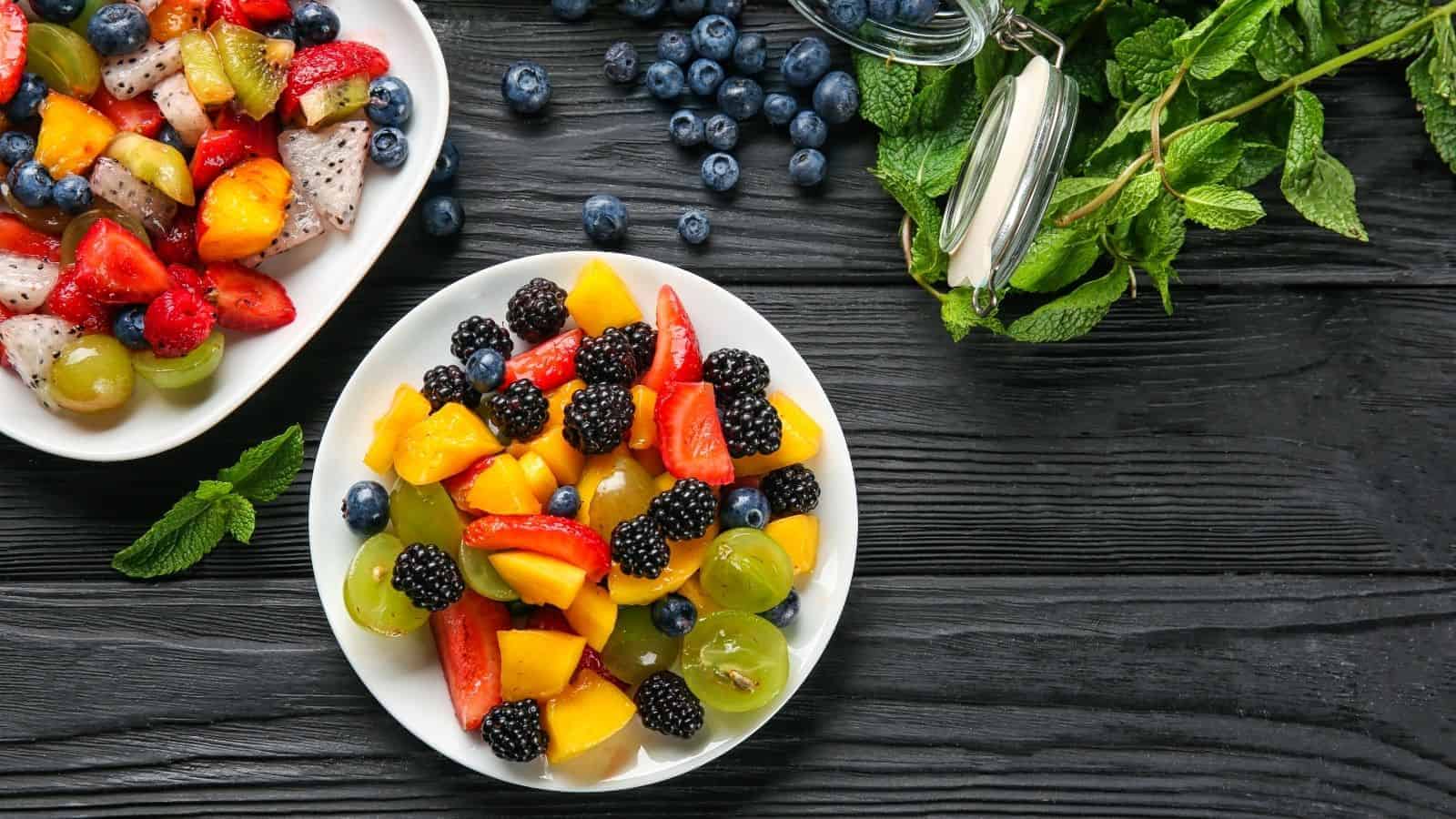If you’ve noticed the price of produce lately, you know that it’s not getting any cheaper. Did you know that the average American household of four people wastes up to $1,600 of produce a year? Would you like to know how to stop throwing away cash and save your organic vegetables and fruits?
How to Wash Your Produce
When you buy certified organic vegetables and fruit, you can be assured that no pesticides or other harmful chemicals were used to raise them. However, it’s still a good idea to always wash the produce you get from the store or your garden with a little vinegar solution.
Directions
- Wash your sink well to get rid of any lingering bacteria, then fill it halfway with lukewarm (not hot) water.
- Add 1 cup of white vinegar and use a spatula to stir it nicely.
- Add your fruit or veggies and allow them to soak for about 10 minutes (3 minutes for berries)
- For some heavy skinned veggies or potatoes, use a vegetable brush to brush away any dirt.
- Rinse the fruits and vegetables well with plenty of cold water.
- Dry your produce with paper towels. Use a spinner to dry your leafy veggies completely.
- Do not worry that your produce will taste like vinegar because it won’t if you rinse it well. If you don’t have white vinegar, apple cider vinegar will do just as well. You can also sprinkle your produce with a little baking soda, let it sit for a couple of minutes, then rinse well.
12 Ways to Extend the Life of Produce
1. Bananas
When it comes to America’s favorite fruit, bananas top the list. A USDA report revealed that Americans consumed at least 14.1 pounds of this tropical fruit annually. They ripen and then turn brown quickly, so storage and timing are of the essence.
Choose organic bananas while they are firm and still a bit green. Only buy what you can use in a couple of days and store them openly at room temperature. To preserve these yellow wonders, peel, slice them, then freeze or dehydrate them.
2. Berries
If you want to enjoy the sweetness of nature, you can’t go wrong with berries, especially the dark ones like blackberries and blueberries. They are loaded with antioxidants that protect your cells against free radicals, and they have a low glycemic index. They add the perfect touch of juicy sweetness to any food.
Of all the organic vegetables and fruit you buy, they are the most perishable. Wash them thoroughly in a vinegar solution, dry them, and refrigerate them in their original package. If you can’t eat them within a couple of days, freeze them in a single layer on a sheet pan, seal them in reusable freezer bags, and keep them frozen for up to six months.
3. Avocado
What would Tex-Mex style cuisine be without tender slices of this green wonder? This delightful pitted fruit can also boost the flavor factor for sandwiches, salads, and smoothies. Its heart-healthy oil is rich in Omega-3, which is an essential fat. Avocados are the star ingredient of classic guacamole sauce.
Like many organic vegetables and fruit, avocados are best when consumed as soon as possible. Their delicate green flesh browns quickly with oxidation, so coat a leftover half with lemon juice, wrap in plastic, and store in the refrigerator. You should also store whole varieties for no more than two to three days.
4. Greens
When you pick up your organic vegetables and fruit at the store or farmer’s market, don’t forget the greens. Whether you prefer mustard, kale, collard, or turnip tops, they make the ultimate side dish when cooked or tossed in a salad.
Even if you get a bag of mixed varieties that are pre-washed, it’s still a good idea to give them another wash and spin or pat them completely dry. Put them in a reusable sealed bag and store them in your fridge crisper for the best taste and texture.
5. Onions
These humble bulbs have been treasured for thousands of years, hence the stunning onion-shaped domes on beloved buildings worldwide. They, along with their pungent cousin garlic, provide zesty flavor cooked or raw.
Don’t make the mistake of storing whole onions in the refrigerator, where they will go bad quickly and leave an unsavory aroma. Instead, place them in brown paper bags with holes for ventilation and store them in a cool, dry place. Sliced ones can be stored for up to a week in a reusable sealed bag in the refrigerator.
6. Potatoes
Spuds are royalty among the world’s favorite organic vegetables and fruit. They are one of the most versatile foods you can imagine, whether they are prepared with other foods or stand-alone. These tasty tubers come in many varieties and a rainbow of colors.
To keep your potatoes their freshest for up to six months, place them in reusable mesh bags and store them in a cool, dark place, like a cellar or basement. Avoid storing them close to other vegetables, especially onions. Preserve their freshness by only washing what you need for the meal.
7. Fresh Herbs
Herbs were one of the earliest crops that humans cultivated since they were valued for medicine and food. You can use them fresh or dried to enhance the flavor of almost any dish. They are also easy to grow in your yard or the kitchen, so you always have fresh herbs on hand.
Soft herbs like dill or cilantro should be stored upright in a glass of water on your counter, with a water change every two or three days. To store woody herbs like rosemary or thyme, roll them up in a damp paper towel, seal them in a reusable bag, and keep in the refrigerator. Both types will keep this way up to two weeks.
8. Mushrooms
There’s been a fungus among us since recorded history when humans learned to tell the difference between what was food and what was a deadly poison. The delightful beauty of these fungi is that they come in countless varieties and lend a meaty, earthy taste fresh or cooked.
Keep your shrooms fresh by sealing them unwashed in a clean paper bag and putting them in the fridge for up to a week. Use a damp paper towel to wipe off the fungi before eating. You can freeze cooked mushrooms, but not fresh ones.
9. Nuts and Seeds
One of the best sources of meatless protein and essential fatty acids are nuts and seeds. A small handful of almonds, pecans, or walnuts is the ideal snack to keep you satisfied without the guilt. Their imitable flavor and crunch enhance savory and sweet dishes in most global cuisines.
Nuts and seeds in the shell can be put into a sealable glass or plastic containers for best storage. If they are still in the shell, place them in your pantry for up to four months. Those that are shelled can be put in your freezer for up to a year.
10. Lettuce
Did you know that the lettuce family includes many varieties for your dining pleasure, not just the iceberg variety? They can be loose-leaf, romaine, butterhead, or asparagus style. You can use them for countless salad recipes or as a yummy sandwich topping.
Lettuce and other leafy organic vegetables perish quickly, so it’s best to use them for a couple of days. Wash the leaves and make sure they are totally dry. Wrap some dry paper towels around them, place them in a reusable sealed bag or container, and store in your crisper for up to three days.
11. Tomatoes
Who would have believed that tomatoes were once thought to be poisonous because they belong to the deadly nightshade family? Fortunately, naysayers were proven wrong, and these glorious fruits have become one of the most versatile crops known.
Keep your tomatoes at peak flavor by arranging them on your kitchen counter out of direct sunlight. You may also store ones that are overripe or sliced in the fridge for up to three days. For long term storage, chop and can them to last up to 18 months or freeze in resealable bags for up to four months.
12. Citrus Fruit
Citrus fruits like oranges, lemons, limes, and grapefruit are a powerhouse of Vitamin C and other beneficial antioxidants. They add the perfect touch of tangy sweetness to countless savory and sweet dishes from around the world. These tropical treasures tend to be a bit pricey, so proper storage is essential.
If you find a good buy on some citrus fruit, like tangy lemons, you can prepare it for longer storage. Slice or quarter whole fruits, place in a single layer on a sheet pan, and freeze. Place the frozen slices in reusable sealed bags and freeze for up to three to four months.
Final Thoughts on Making Organic Vegetables and Fruits Last Longer
Buying or raising organic vegetables and fruit helps you provide nutritious meals and snacks for you and your family. Don’t throw money down the drain by letting your produce go to waste. When you wash and store it the correct way, you will have plenty of healthy food and virtually no waste.
















 Community
Community

